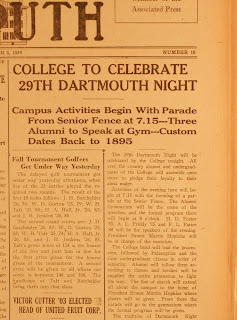 The D and other voices of Dartmouth usually gush over Dartmouth Night. Now the bonfire is an iconic symbol of Dartmouth and student scrapbooks from the early twentieth century record the night so it could be remembered as the good old days. Today we stumbled on a less than enthusiastic response from Radford Tanzer, class of 1925. In the fall of 1924, his senior year, he finally decided to check out the annual festivities. His description is a classic in understatement:
The D and other voices of Dartmouth usually gush over Dartmouth Night. Now the bonfire is an iconic symbol of Dartmouth and student scrapbooks from the early twentieth century record the night so it could be remembered as the good old days. Today we stumbled on a less than enthusiastic response from Radford Tanzer, class of 1925. In the fall of 1924, his senior year, he finally decided to check out the annual festivities. His description is a classic in understatement:Tonight is Dartmouth Night, when they have a big rally and a lot of speeches, and yells, and all that sort of thing. I wasn't so crazy for all that stuff, but went out with Dave to watch the torchlight procession.He goes on to say he enjoyed the scene:
I'd never seen it from the outside before; it was beautiful to see that great long stream of lights winding across the campus with the band playing and the cheers echoing back and forth from one end of the line to the other.Tanzer went on to become a pioneering plastic surgeon and faculty member at the Dartmouth Medical School (now named after his classmate, Ted Geisel). He certainly enjoyed college, but wasn't the most enthusiastic student on the social scene. His letter home about Winter Carnival from his senior year calmly states, "The Carnival wasn't violently exciting without a girl. It was quite a novelty to have such a flood of girls here all at once." But another letter relates, "Had quite an exciting meeting of the biology club the other night."
His letters are a delight to read. You can see them by asking for ML-102, Box 47.




